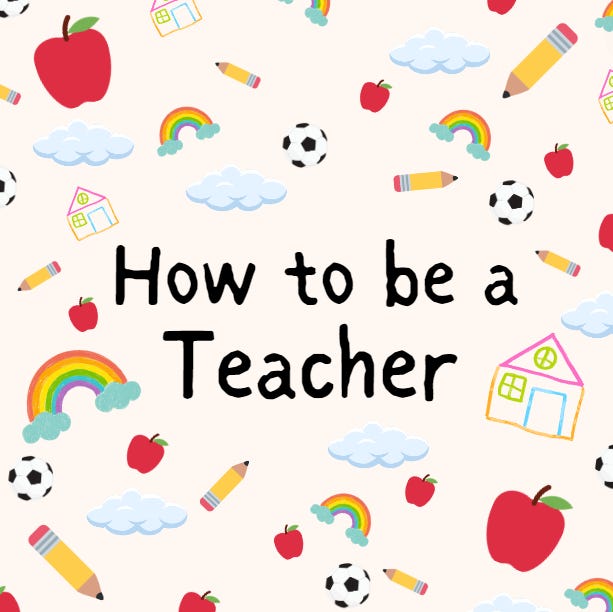How to Drive Your Students to Achieving Something Great
This may only be one factor in them succeeding but it's a vital one
Welcome to How to be a Teacher. I’m Jack, and today I have a story that inspires me to speak to my students the right way. I want them to achieve their dreams and this is how you do it. Read on below to find out what you can do to help your students achieve their dreams, too.
“The way you speak to children becomes heir inner monologue” - Anonymous, somewhere online (let me know who I can credit if you know).
“When people say, ‘Oh you’re talented, you’re born with natural talent,’ I’m like ‘No!’ Ok, have a listen to this, right.”
Interviewer: ”Has this been played in public before?”
Interviewee: ”No.”
Interviewer: ”This is an exclusive!”
Interviewee: ”All I’m saying is, when people say artists are born with talent you’re not. You have to learn. And really practise. This is me playing the guitar and sunging.”
A few seconds pass. Ed Sheeran (the interviewee) plays an audio clip that starts with some guitar. The audience wait with bated breath.
Then, a singing voice - his singing voice from when he was younger - enters and laughter, mingled with cringing, ensues.
So how did he become the talent that he is today?
Well, there are, of course, many factors. His parents paid for music lessons. His dad was an art curator, so the arts were always at the forefront of their lives.
But I’m fascinated with the fact that, at first, Ed’s singing was… well, it was shit. Really dreadful. And yet he became perhaps the most listened-to artist in the world.
That’s not going from shit to a bit alright. That’s going from shit, where we all begin, to global stardom. Total conquering of the music world.
And there’s one thing his parents did that made the difference.
They never doubted him.
They encouraged him to an incredible extent.
"Imogen [Ed’s mum] and I encouraged Edward’s creativity, including drawing and painting, from early childhood.
“In 2019, after the end of his Divide world tour, he took up painting again, producing 40 abstract pictures in a month.
"As with his music, he was just incredibly driven. He was inspired by the technique and style of Jackson Pollock. I filmed and photographed him at work."
What about when he was younger?
The family were hit hard by the 2007/2008 financial crisis and supporting Ed’s music hobbies wasn’t easy.
“We were finding it difficult to support them. Out of urgent necessity, we needed to change our work direction.
"We decided to focus on what we both individually wanted to do. Imogen started a jewellery-making business from scratch, working from home. I started a public art lecturing business combining art history with art appreciation."
This was a well-to-do family that might have managed on one income, given their professional backgrounds, but that wouldn’t have been enough to fund the music.
What stands out the most for me, though, is this line:
In order to support their sons' passions, John explained how they changed their work and occupation.
Passions. Not talents - passions.
This isn’t natural talent being given room to thrive.
This is passion and drive being moulded into talent by encouragement and care.
This is something every educator should learn from.
I’m going to go deep now.
I want you to think of something your parents or family members said to you when you were younger. Something about you. Something that has stuck with you and remains your own belief about yourself.
Mine?
I’m proud of you.
You’ve got a sciencey mind.
You aren’t organised.
I think often about this line:
What we tell children becomes their inner monologue.
This definitely happened with me. I grew up wondering whether my mum was proud of me but she increasingly told me so when I first expressed my doubts.
I could be quite black and white as a kid and my mum always talked about my scientific, methodical mind.
And I was a very disorganised child. I was in detention all the time in secondary school for no reason other than forgetting my homework so often.
So, has this become my internal monologue?
I feel enough pride in myself to not need it from others. Probably because I know I have it elsewhere and don’t need to fight for it. I’ve learned that it’s unconditional - a result of being told the right things as a kid.
I have increasingly embraced my creativity as I’ve grown older. I occasionally like to draw, I can be quite impulsive, I have started a side-business as a copywriter, I’m halfway through a first draft of a novel, I write as my biggest hobby, I cook in a very hap-hazard manner… the list goes on. I always believed I had a sciencey mind and often see the benefit in doing things methodically but I’ve learned as an adult that it’s not a fixed thing for me. That’s not me, not really.
And my organisation? I still tell myself all the time how disorganised I am, yet I often look at how other organise themselves around me and I know I can do better than they are in certain situations. Because of my challenges, I’ve developed strategies to overcome them. I make the odd slip but, on the whole, I think I am organised now. I have a highly demanding job and the cognitive overload makes it difficult, but I do enough.
But it has taken years to realise - or debunk - the truth in what I was told.
Because what I was told as a child became what I tell myself, and sometimes the hardest mind to change is your own.
What about our students?
Because of this background, I wait to find out what my students want to be, where their passions lie and how they dream before championing them.
One of my students is the most talent artist I’ve ever met. Seriously gifted. What they can do at 10 I’ll never come close to doing.
And, early in the year, I asked them what they want to be when they grow up, thinking I knew what the answer would be.
What did they say? “A professional footballer.” I was surprised, I’ll admit.
I congratulate their art whenever I see it because it’s something they enjoy and something they’re very good at.
But I’ve spent time on the playground with them and a football when I’ve seen them look a little lonely. I’ve made a conscious effort during football training sessions to give them something different to do, something difficult like a Cruyff turn or a half-volley. I’ve asked them about their favourite footballers.
And, as a Liverpool fan, I have a bit of banter with them for supporting Manchester United.
I’ve also told the keenest joker in the class that I’d love to see them on stage with a successful stand-up career. I’ve given others lacking confidence the chance to lead a whole lesson. I’ve personally picked out books for my most avid readers and I’ve had another talented artist’s work put on a jumper I wore at work.
I want them to believe in their passions and I want what I say to fuel that. As they grow up, I want words of encouragement and hope to become their inner monologue.
Are they all natural talents? Of course not.
But, according to the most successful musician of recent years, neither was he. If my students are completely lacking in talent, I still encourage them. I let one student take up my lunch breaks every day for two weeks so they could practise their singing in an attempt to make it in the school talent show.
They didn’t get through - not even close. But, since then, they seek me out on the playground to sing me another song they’ve just created and they’re getting better. Maybe, one day, we’ll have a new global superstar on our hands.
Just imagine if Ed Sheeran’s parent didn’t believe in his passions, didn’t curate his talents. Whether you like his music or not, he has touched the lives of millions and allowed other musicians to succeed in the industry. The world is better for having Ed Sheeran’s talents in it.
Passion and encouragement might be the difference for your students to achieve their dreams.
There’s more…
I made a reference to two students whose passions I’ve encouraged above. Here are the articles I wrote about those situations:
Thanks for reading. Don’t forget to subscribe if you like what you read - I post every week and you’ll get those posts sent straight to your inbox. Just click the button below.






